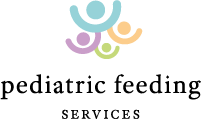Feeding problems come in all shapes and sizes, just like all of us.
No matter how extensive the feeding problem one thing all have in common is that they result in significant stress to the child, parents and family. With more than 30 years of clinical practice in feeding, I have evaluated and treated countless feeding problems. With this level of experience, I am able to identify trends and can speak to expected outcomes and length of time to get there.
What is your feeding struggle?
the toddler years
As children advance in age they become more protective and determined in their avoidance of food and their behavior really starts to ramp up. They now have more anxiety and more learned negative behavior around food. Most children who exhibit this behavior do so because something is not right either medically or with the function of their mouth either from a motor perspective or sensory response or a history of such. Their refusal may very well be appropriate protective behavior. Here are some of the common feeding problems seen with this age group.
Not advancing to solid food as the primary source of their diet
Tethered oral tissues - “tongue tie” not previously diagnosed
Poor chewing skills
Only eat select chewing foods
Prolonged bottle or breast-feeding dependence or drink for the majority of their calories
Consuming insufficient volume of food, may be losing weight
More frequent temper tantrums around eating – crying, gagging, vomiting, throwing food
Refusing to let others feed them but not feeding themselves enough
Starting to refuse foods that they had been eating previously, begin to become increasingly “picky” and begin dropping foods or food groups.
Becoming reliant on others to feed them – not feeding themselves with a spoon, fork or cup
For some medically complex children, this might be the first time that they are medically stable enough to begin eating by mouth. They may be toddlers chronologically but they’re feeding experience is that of a newborn.
preschool through school age
Often feeding issues as the child reaches school age are described as very “picky” or “selective” eaters. The child may have had feeding issues at a younger age and parents were hopeful or assured they would out grown them. Many children just grow up with this or the problem continues to grow. Now starts the parent panic- What will they eat in school? How will this affect them socially? What will be the long term effects of eating a poorly balanced diet? Here is what you may be seeing:
Highly selective eater – brand, texture, presentation specific
Will only eat select foods in certain settings/locations
Demonstrate significant fear and anxiety when faced with new food or asked to try a new foods
Are missing whole food groups in their diet
Food refusal, gagging or vomiting when faced with new food
Holding food or chewing for a long time
Poor weight gain
Excessive weight gain due to poor diet
Unable or unwilling to attend social events
medically complicated cases – children of all ages
There are many secondary diagnoses that can cause or are related to feeding problems. Parents often need help navigating multiple specialty services to come up with a plan to help their child learn to eat. Coordinating care amongst other healthcare professionals reaching medical stability is key. Here are some of the issues these children may need help with:
Food allergies – finding safe foods that the child is willing and able to eat
G-tube or NG tube weaning – learning to eat by mouth
Improving oral motor skills preparing the mouth for eating
Introducing the spoon for the first time
Introducing drinking for the first time
Moving beyond just playing or tasting food
Advancing across textures and learning to chew
Learning how to feed themselves
Feeding problems are often intertwined with other medical and developmental factors. Here are some of the more common diagnoses that may cause a secondary feeding problem.
Coordination of care with other health care providers and getting your child medically stable is key!
Delayed Development
Prematurity
Oral/pharyngeal Dysphagia
Developmental Disabilities
Sensory Processing Disorder
Autistic Spectrum Disorder
Psychosocial Difficulties
Behavior Difficulties
Anxiety
Avoidant/Restrictive Food Intake Disorder
Difficult Parent/Child Interaction
Medical, GI, Chronic Illness, Genetic
Gastroesophageal Reflux
Dysmotility Syndromes
Failure to Thrive
Cardiac issues
Chromosomal Abnormalities
Esophageal Atresia/TEF
Cerebral Palsy
Pulmonary issues
Tongue Tie
Eosinophilic Esophagitis/severe food allergies
Constipation






